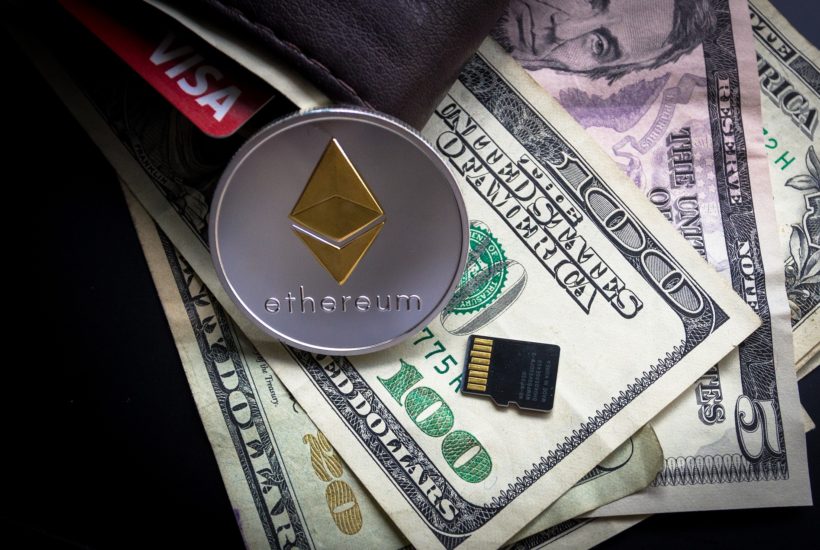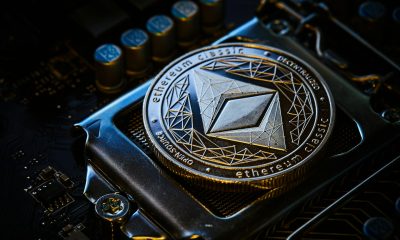Crypto
Ethereum founder appeals to use ETH as a means of payment
Ethereum is widely used as a payment method and is mainly supported by small and medium-sized enterprises and the Enterprise Ethereum Alliance (EEA). The EEA brings together organizations from around the world to develop Ethereum’s blockchain ecosystem. Vitalik Buterin, Ethereum co-founder, now asks people to use more ETH as means of payment, pointing out that it has a lot of benefits.

In a recent post on Twitter, Vitalik Buterin, the co-founder of Ethereum, noted that ETH offers many advantages and appealed to use the cryptocurrency more as a means of payment.
According to Buterin, this has the advantage that when using ETH as a means of payment, all other Altcoins running on the Ethereum Blockchain can be used at the same time without any further effort. In response to this request, many responded that they would be happy to do so, but that Ethereum has too high transaction costs due to lack of scalability.
“More people should support ethereum for payments. The nice thing about supporting ethereum is that you not only accept ETH, but also get support for MKR, UNI, WBTC and any Stablecoin for free. And there are already about three working layer 2 scaling solutions in Mainnet.”
Vitalik Buterin made these comments in response to a contribution from Spencer Noon, CEO of DTC Capital, who pointed out that Square is making a bad business decision because they failed to support Ethereum for payments in addition to Bitcoin.
“No one will ever be able to convince me that @Square’s refusal to support Ethereum (in addition to Bitcoin) is not stupid. It is the most headstrong crypto strategy we have ever seen from a large company, and that means something…”
Find more about Ethereum and why its founder thinks ETH should be used as a means of payment with our companion app. Download Born2Invest mobile app for free and find the latest financial headlines.
The Cash App from Square
Jack Dorsey of Twitter, the CEO and chairman of San Francisco-based Square, co-founded the payment company to make payments convenient, fast, comprehensive and cost-effective. Square’s largest product, the Cash App, enables people to send or receive money directly on a peer-to-peer basis with no hidden fees, and offers a free Visa card, the Cash Card. Cash App is also a Bitcoin exchange that allows users to buy, sell, deposit, store and withdraw Bitcoin.
In August 2020, Square reported that its Cash App revenues from Bitcoin increased 600% to $875 million in the second quarter, bringing the company’s profits up 711% to $17 million. The Company attributed Bitcoin revenues and gross profit to an increase in Bitcoin sales and growth in customer demand.
Currently, the Cash App is recognized as the fastest growing digital wallet in the U.S., accounting for up to 72% of Square’s total revenue, with an estimated 30 million active users per month.
Ethereum or Bitcoin: Which is the better payment method?
Ethereum is widely used as a payment method and is mainly supported by small and medium-sized enterprises and the Enterprise Ethereum Alliance (EEA). The EEA brings together organizations from around the world to develop Ethereum’s blockchain ecosystem.
Unlike Bitcoin, which is primarily used to send and receive payments, ETH is also a utility token that supports the development of distributed applications on the ETH Blockchain.
Both Bitcoin and Ethereum are based on the proof-of-work consensus algorithm, which makes transactions slower and more expensive as network activity increases.
However, Bitcoin has developed several solutions to overcome scalability limitations while Ethereum still has to introduce its new proof-of-work network (ETH 2.0), which not only solves scalability issues but also aims to increase investor confidence in the value of ETH.
The latest development in ETH 2.0 is the launch of the Spadina test network on September 29th, to give the stakeholders a final run before the official launch, which is expected to take place before November 30th.
__
(Featured image by WorldSpectrum via Pixabay)
DISCLAIMER: This article was written by a third party contributor and does not reflect the opinion of Born2Invest, its management, staff or its associates. Please review our disclaimer for more information.
This article may include forward-looking statements. These forward-looking statements generally are identified by the words “believe,” “project,” “estimate,” “become,” “plan,” “will,” and similar expressions. These forward-looking statements involve known and unknown risks as well as uncertainties, including those discussed in the following cautionary statements and elsewhere in this article and on this site. Although the Company may believe that its expectations are based on reasonable assumptions, the actual results that the Company may achieve may differ materially from any forward-looking statements, which reflect the opinions of the management of the Company only as of the date hereof. Additionally, please make sure to read these important disclosures.
First published in CRYPTO MONDAY, a third-party contributor translated and adapted the article from the original. In case of discrepancy, the original will prevail.
Although we made reasonable efforts to provide accurate translations, some parts may be incorrect. Born2Invest assumes no responsibility for errors, omissions or ambiguities in the translations provided on this website. Any person or entity relying on translated content does so at their own risk. Born2Invest is not responsible for losses caused by such reliance on the accuracy or reliability of translated information. If you wish to report an error or inaccuracy in the translation, we encourage you to contact us.

-

 Impact Investing6 days ago
Impact Investing6 days agoCDP Approves €1.5 Billion Package to Boost Industry, Renewables, and International Development
-

 Crypto2 weeks ago
Crypto2 weeks agoUniswap and BlackRock Partner to Launch BUIDL in DeFi
-

 Impact Investing1 day ago
Impact Investing1 day agoThe Sustainability Revolution: Driving a Net-Zero, Nature-Positive Economy
-

 Biotech1 week ago
Biotech1 week agoNew Molecular Clues Explain Aggressive Neuroblastoma and Point to Targeted Treatments























